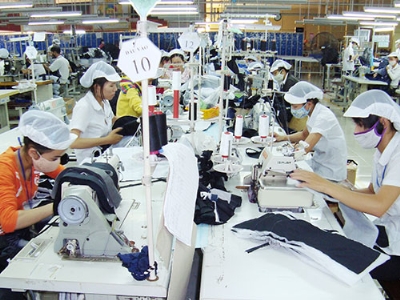Garment, textile tech companies bank on Vietnam
 |
On July 7, French company Lectra announced the opening of its subsidiary Lectra Vietnam.
Lectra, which provides technology solutions dedicated to industries using fabrics, leather, technical textiles, and composite materials, has been present in the country for over 20 years, represented by its agent Ly Sinh Cong Trading Service Company (LSC) for the past twelve years. The new subsidiary will take over LSC's team and assets. According to the company, this represents a key step in Lectra’s development plan in Asia.
“Vietnam is one of the most dynamic Southeast Asian economies. It is a top choice for manufacturers who focus on production cost and brands seeking to diversify supply. The Trans-Pacific Partnership (TPP) agreement signed in February 2016 will reinforce the attractiveness of the country, where Lectra already has many customers, including very large Asian companies,” said Lectra’s CEO Daniel Harari.
Yves Delhaye, Lectra’s managing director for the ASEAN, Australia, South Korea, and India, said that the company aims to develop even further its already close ties with companies present in the country.
“Several of our Chinese and South Korean apparel customers manufacture a portion of their products in Vietnam. They are very interested in innovative solutions to improve product quality, operation efficiency, and the productivity of their factories. Moreover, a growing number of automotive industry players are investing in Vietnam. Lectra will be there to help develop their production," he said.
Lectra is not alone in its quest to cash in on Vietnam’s growing garment manufacturing industry. Earlier this month, New Zealand company ShapeShifter, which provides software to optimise production for industrial users of textiles, leather, and metal, announced that it is finally setting up its customer support team in Vietnam this year, after twelve months of pushing its sales activities in Asia, particularly in Taiwan and Vietnam.
CEO Tim White said he expected the demand for Shapeshifter’s products in Vietnam and surrounding Southeast Asian nations would increase as the region engage in more worldwide trade.
Meanwhile, the German Textile Machinery Association (VDMA), as the representative of 130 textile machine and equipment manufacturing companies, met with Vietnamese companies in the textile and support industries in Hanoi and Ho Chi Minh City last week, to introduce the latest German technologies.
Thomas Waldmann, managing director of the VDMA, also cited the TPP as a key reason for the association’s interest in providing machinery to the Vietnamese textile manufacturing industry. “Due to the recently signed TPP, Vietnam is increasingly becoming a much preferred textile manufacturing location for companies worldwide,” he said.
Truong Van Cam, deputy chairman of the Vietnam Textile and Apparel Association (VITAS), which supported the event, said a considerable proportion of technologies in the Vietnamese current textile and apparel industry needed to be transformed to improve quality, especially for those supplying cloth for garment production for export.
The textile, apparel, and footwear industries, all of which are rated amongst Vietnam’s major export sectors, with a total annual turnover of $27 billion in 2015, are expected to benefit the most from the lowered tariffs after the TPP comes into effect. Fellow TPP members, such as the US and Japan, are also Vietnam’s largest export partners in textile and footwear, bringing great opportunities to Vietnamese exporters in these sectors.
What the stars mean:
★ Poor ★ ★ Promising ★★★ Good ★★★★ Very good ★★★★★ Exceptional
Related Contents
Latest News
More News
- Hermes joins Long Thanh cargo terminal development (February 04, 2026 | 15:59)
- SCG enhances production and distribution in Vietnam (February 04, 2026 | 08:00)
- UNIVACCO strengthens Asia expansion with Vietnam facility (February 03, 2026 | 08:00)
- Cai Mep Ha Port project wins approval with $1.95bn investment (February 02, 2026 | 16:17)
- Repositioning Vietnam in Asia’s manufacturing race (February 02, 2026 | 16:00)
- Manufacturing growth remains solid in early 2026 (February 02, 2026 | 15:28)
- Navigating venture capital trends across the continent (February 02, 2026 | 14:00)
- Motivations to achieve high growth (February 02, 2026 | 11:00)
- Capacity and regulations among British areas of expertise in IFCs (February 02, 2026 | 09:09)
- Transition underway in German investment across Vietnam (February 02, 2026 | 08:00)

 Tag:
Tag:




















 Mobile Version
Mobile Version